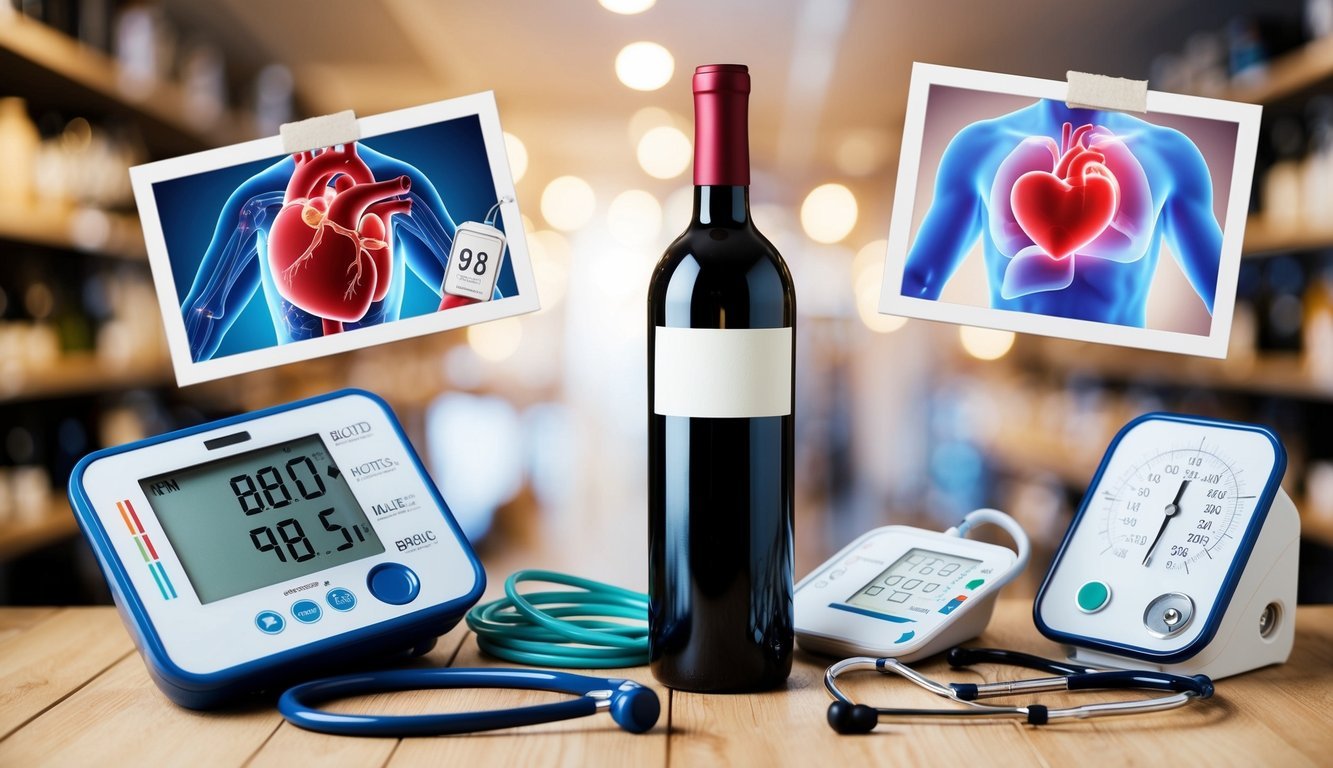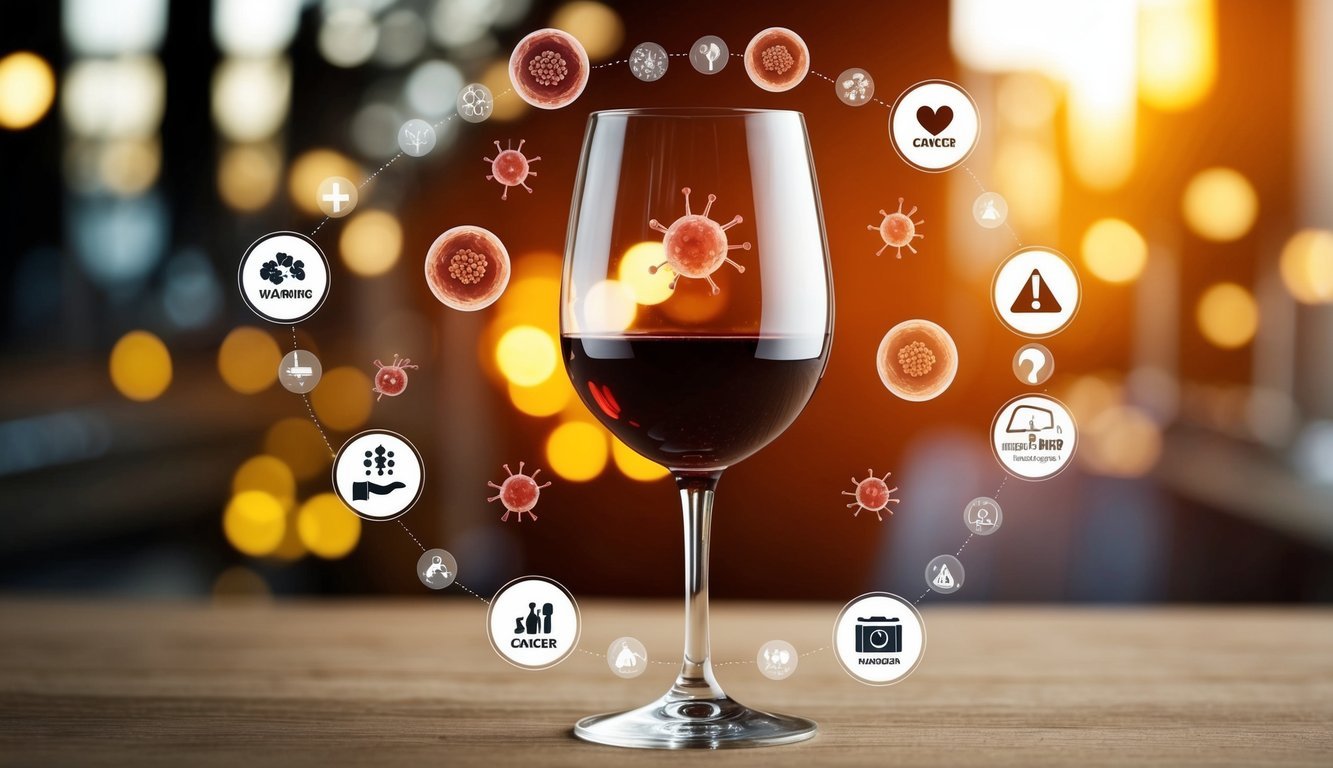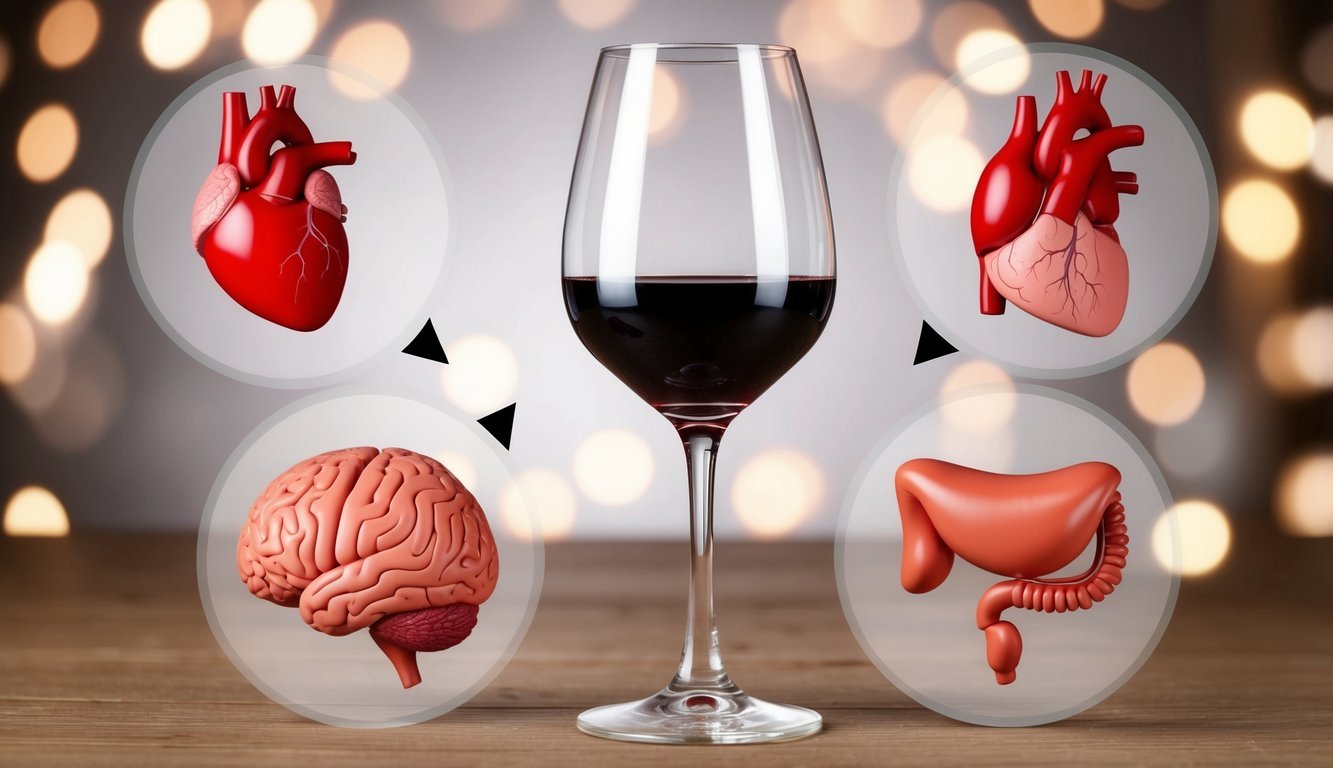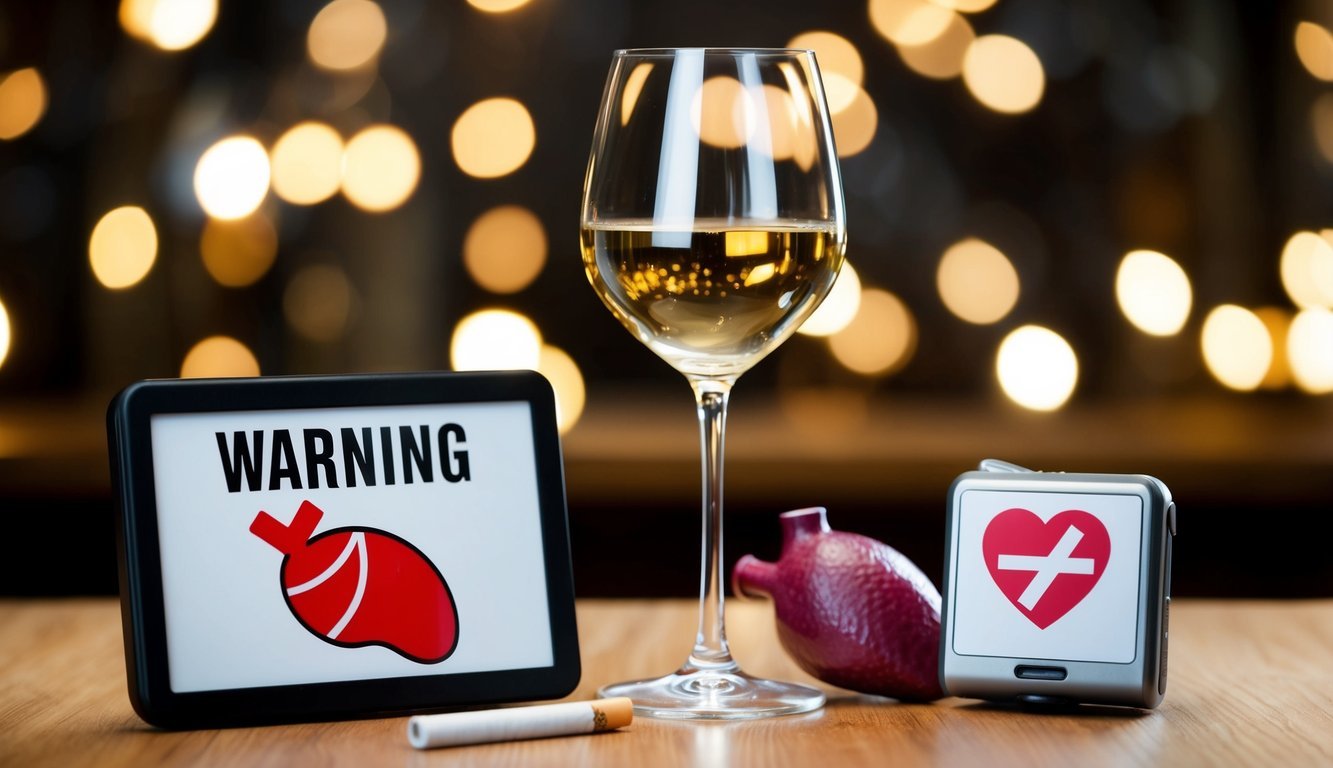Wine has long been celebrated for its rich flavors and potential health benefits, but it’s crucial to understand that it also comes with risks.
As you enjoy your favorite glass of red or white, you may not realize the hidden dangers lurking within.
Drinking wine can impact your health in ways you might not expect. From increased cancer risks to liver damage, the effects of alcohol consumption extend far beyond a simple hangover.
Let’s explore four significant health risks associated with wine that you should be aware of to make informed decisions about your drinking habits.
1) Increased risk of liver disease

Wine consumption can significantly impact your liver health.
While moderate drinking may seem harmless, excessive wine intake puts you at risk for various liver conditions.
One of the primary concerns is alcoholic fatty liver disease.
This occurs when fat accumulates in your liver cells due to alcohol metabolism.
It’s often the first stage of alcohol-related liver damage.
Regular heavy drinking can lead to more severe liver issues.
Prolonged excessive wine consumption may cause inflammation and scarring of liver tissue, potentially progressing to cirrhosis.
Cirrhosis is a serious condition where healthy liver cells are replaced by scar tissue.
This can impair your liver’s ability to function properly, leading to numerous health complications.
Your risk of developing liver disease increases with higher alcohol consumption.
Drinking more than 2-3 alcoholic beverages daily or engaging in binge drinking can harm your liver.
To protect your liver health, it’s crucial to limit your wine intake.
Men should aim for no more than two drinks per day, while women should stick to one or fewer.
This helps reduce the likelihood of alcohol-related liver damage.
2) Potential for addiction and dependency

While wine can be enjoyable in moderation, it’s important to be aware of its addictive potential.
Your brain releases dopamine when you drink, creating pleasurable feelings that can lead to cravings.
Over time, you may find yourself needing more wine to achieve the same effect.
This tolerance can sneak up on you, gradually increasing your consumption without you realizing it.
Regular wine drinking can also become a habit, something you rely on to relax or socialize.
You might start to feel anxious or irritable when you can’t have your usual glass.
If you notice you’re drinking more than intended or having trouble cutting back, it could be a sign of developing dependency.
Pay attention to how often you think about wine or if you’re using it to cope with stress or emotions.
Remember, addiction can happen to anyone, regardless of how much or what type of alcohol they drink.
If you’re concerned about your wine consumption, don’t hesitate to reach out to a healthcare professional for guidance.
3) Higher likelihood of heart disease

Contrary to popular belief, excessive wine consumption may increase your risk of heart disease.
While moderate drinking is often associated with cardiovascular benefits, overindulging can have the opposite effect.
Regular heavy drinking can lead to high blood pressure, a major risk factor for heart disease.
It may also contribute to an irregular heartbeat, weakening your heart muscle over time.
Excessive alcohol intake, including wine, can raise triglyceride levels in your blood.
This can increase the risk of fatty liver disease and potentially harm your heart health.
Drinking too much wine can also lead to weight gain.
Excess body weight puts additional strain on your heart, potentially increasing your risk of cardiovascular issues.
It’s important to note that any potential benefits from wine consumption are typically associated with light to moderate intake.
Exceeding recommended limits can negate these benefits and potentially harm your heart health.
4) Possible links to cancer development

Recent research has shed light on the connection between wine consumption and cancer risk.
While moderate drinking was once thought to be harmless, new evidence suggests otherwise.
Studies show that alcohol, including wine, is associated with higher risks of certain head and neck cancers.
This includes cancers of the oral cavity and pharynx.
Wine consumption has also been linked to increased risks of breast cancer.
Even low to moderate intake may raise the likelihood of developing this disease.
The relationship between alcohol and cancer risk often follows a dose-response pattern.
This means that higher levels of wine consumption are typically associated with greater cancer risk.
It’s important to note that alcohol is now recognized as a risk factor for six major types of cancer.
This includes cancers of the breast, liver, colon, and esophagus.
Quitting or reducing alcohol intake may help lower your cancer risk.
Some studies suggest that sustained abstinence from alcohol can have protective effects against cancer development.
Understanding Wine Consumption

Wine consumption involves more than just enjoyment – it’s important to be aware of its effects on your body.
Knowing the alcohol content and differences between wine types can help you make informed choices about your drinking habits.
Alcohol Content and Its Effects
Wine typically contains 11-13% alcohol by volume, though this can vary.
Your body processes about one standard drink (5 oz of wine) per hour.
Consuming more than this leads to increased blood alcohol concentration.
Effects of wine consumption include:
- Relaxation and reduced inhibitions
- Impaired judgment and reaction time
- Dehydration
- Sleep disruption
Over time, regular heavy drinking may increase risks of liver disease, certain cancers, and cardiovascular issues.
Moderation is key – stick to 1 drink daily for women or up to 2 for men to minimize health risks.
Difference Between Types of Wine
The main types of wine are red, white, and rosé.
Their key differences include:
Red wine:
- Made from dark-colored grapes with skins left on
- Higher in tannins and resveratrol
- May have slightly more health benefits
White wine:
- Made from white grapes or red grapes with skins removed
- Generally lighter and more acidic
- Lower in calories than red wine
Rosé:
- Made from red grapes with limited skin contact
- Lighter in color and flavor than red wine
- Often lower in alcohol content
Your choice impacts not just taste, but also calorie intake and potential health effects.
Consider these factors when selecting wine to drink.
Health Implications of Wine

Wine consumption can have significant effects on various aspects of health.
Understanding these impacts is crucial for making informed decisions about alcohol intake.
Impact on Liver Health
Drinking wine regularly can take a toll on your liver.
Even moderate consumption may lead to fat accumulation in liver cells over time.
This can progress to alcoholic fatty liver disease, potentially causing inflammation and scarring.
Heavy wine intake increases the risk of cirrhosis, a serious condition where healthy liver tissue is replaced by scar tissue.
This impairs liver function and can be life-threatening.
Your liver processes alcohol, so giving it frequent breaks from wine allows regeneration.
Consider alcohol-free days each week to support liver health.
Risk of Heart Disease
Wine’s relationship with heart health is complex.
Small amounts may offer some cardiovascular benefits, but excessive intake raises risks significantly.
Moderate red wine consumption might increase “good” HDL cholesterol and reduce “bad” LDL cholesterol.
The antioxidant resveratrol in red wine may help protect blood vessels.
However, drinking more than 1-2 glasses daily can raise blood pressure and triglyceride levels.
This increases your risk of heart disease, stroke, and irregular heartbeats.
Alcohol can also contribute to weight gain and obesity, further straining your cardiovascular system.
Effect on Mental Health
Wine can impact your mental wellbeing in both short-term and long-term ways.
Initially, it may reduce stress and anxiety.
But relying on alcohol to manage emotions can lead to unhealthy coping mechanisms.
Regular heavy drinking is linked to increased rates of depression and anxiety disorders.
It can also disrupt sleep patterns, leaving you feeling tired and irritable.
Alcohol interferes with brain chemistry, potentially worsening existing mental health conditions.
In extreme cases, it can contribute to memory problems and cognitive decline.
Moderation is key.
If you’re concerned about wine’s effects on your mental health, speak with a healthcare professional for personalized advice.

